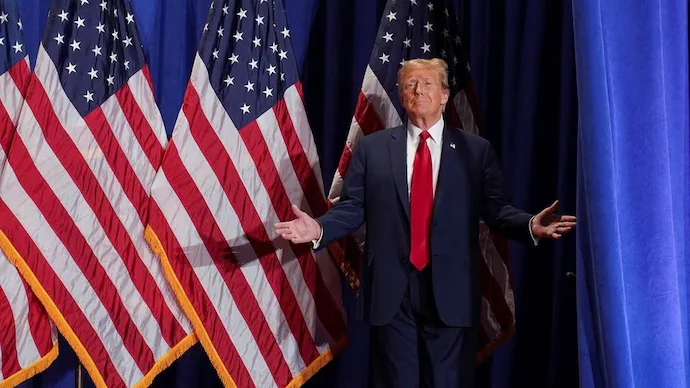Former American president Donald Trump scored a crucial legal victory after the US Supreme Court overturned a decision by the Colorado highest court that had removed him from 2024 ballots over his actions inciting the January 6, 2021 Capitol Riot.
The unsigned unanimous ruling effectively ends efforts to have Trump disqualified from running president again under the Section 3 of the US Constitution Amendment Act. That post-civil war provision explicitly bars the federal office for those who have engaged in insurrection in violation of a previous oath to uphold the nations highest laws.
The result which came on March 4, 2024, had been widely expected after oral arguments last month which all of the justices, conservative or liberal had expressed scepticism about the Colorado court ruling. But though all the justices agreed on the outcome, four judges disagreed with the majority holding that only Congress can enforce Section 3 disturbing political comity that many had hoped to achieve.
The justices all found that states cannot enforce Section 3 as allowing them to do so would create a patchwork of enforcement that could result in damaging inconsistencies. The ruling therefore challenges not just in Colorado, but also in Maine and Illinois where judges have ruled that Trump should be removed from the ballots as an insurrectionist.
“Conflicting state outcomes concerning the same candidate could result in not just from differing views of the merits, but from variations in state law governing the proceedings that are necessary to make the Section 3 disqualifications determinations,” the court held.
Under a worst-case scenario, the states might try to enforce the provision after an election resulting in millions of votes being nullified and potentially changing election outcome. “Nothing in the Constitution requires that we endure such chaos arriving at any time or different times up to and beyond inauguration,” the court said.
A majority of justices have held that only Congress has the power to disqualify a candidate under Section 3. That had been the major point of contention as the provision only specifies that the Congress has the power to remove the disqualification by a two thirds majority.
Trumps lawyers have argued that the language concerning removal meant Congress had exclusive authority over Section 3. Those arguing for disqualification had pointed out that other sections of the 14th Amendment, which is the basis for many civil rights laws, were considered self-executing.
But five conservatives named John Roberts, Neil Gorsuch, Samuel Alito, Brett Kavanaugh and Clarence Thomas had justified their finding by interpreting Section 5, which says that Congress “shall have power to enforce, by appropriate legislation” the provisions of the 14th Amendment.
The three liberal justices of the court named Sonia Sotomayor, Elena Kagan and Ketanji Brown Jackson issued a separate opinion agreeing with the majority that states can’t enforce Section 3, but saying the court should not have decided whether Congress has complete authority to disqualify a federal candidate.
One conservative justice called Amy Coney Barrett, also issued a separate opinion saying she would have preferred the court to confine its finding to state power.
All four stressed that it was unnecessary for the court to create a new rule to decide the Colorado case. The liberals said the finding of congressional exclusivity “shuts the door” on other paths to disqualification, including a federal court finding that a candidate engaged in insurrection. They accused the majority of creating a “special rule” that insulates “all alleged insurrectionists from future challenges to their holding federal office.”
The tenor of the oral arguments had led many to predict a unanimous decision meant to display the courts unity on a politically charged issue, in contrast to is a controversial ruling in 2000’s Bush v. Gore. But the split on congressional exclusivity highlighted the continuing divide. The liberal justices accused the conservative majority of deciding the case in order to insulate Trump from future Section 3 challenges and even cited the dissent in Bush vs Gore, saying, “What it does today, the Court should have left undone.”
They also took aim at many of the conservative justices’ professed adherence to textualism, by which they claim decisions must closely follow to the clear language of the law. “Nothing in Section 3’s text supports the majority’s view of how federal disqualification efforts must operate,” they wrote.
Barrett issued a two-paragraph concurrence in which she said she agreed with the liberal justices but criticized the “stridency” of their opinion. She said “writings on the court should turn the national temperature down, not up. “Trump, who appointed a third of the court, was spared a potentially damaging analysis of his conduct on Jan. 6, 2021, the actions at the heart of the underlying dispute.
None of the justices weighed in on Trump’s effort to overturn the 2020 election, or his actions on the day a mob of his supporters attacked the US Capitol to try to prevent Congress from certifying Joe Biden’s victory.
The Colorado Supreme Court, in contrast, eviscerated Trump’s behaviour in ruling that he engaged in insurrection. By ruling that Colorado couldn’t enforce Section 3, the Supreme Court sidestepped the factual issues entirely. And by saying Congress has exclusive power to enforce Section 3, it also ruled that no court, state or federal, had the power to disqualify Trump based on such a finding.




















Comments